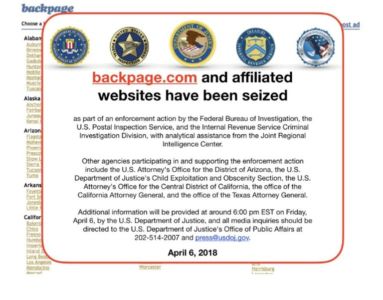Fighting Sex Trafficking One Internet Site at a Time
Dateline Washington: “The Justice Department announces the seizure of Backpage.com, the Internet’s leading forum for prostitution ads, including ads depicting the prostitution of children.”
All I can say is, it is about time.
Since 2010, state and federal politicians and law enforcement have known about Backpage.com’s classified section which offered a seeminglyendless supply of sex partners, many of whom were obviously underaged. From those who escaped the clutches of evil we know that many of the ads featured kidnap victims who had been forced into a life of sex with strangers. Finally, this $500 million enterprise has been shut down.
The National Center for Missing and Exploited Children as well as researchers at various institutions have been shouting from the rooftops about the thousands of confirmed and likely cases of youngsters forced into this dangerous, de-humanizing world via ads on the Internet. Still, Backpage.com lived on.
The response from the U.S. Congress was to launch an investigation a couple years ago and, finally last month, to pass legislation cracking down on these illicit Internet sex marketplaces. It’s called the Stop Enabling Sex Traffickers Act (SESTA) and it will go into effect as soon as President Trump signs it.
The new law is necessary, according to members of Congress, because the owners of Backpage.com and other offending internet sites have been exploiting a loophole in the Communications Decency Act which allowed them to dodge responsibility for content posted by their users.
But as we see in the Department of Justice’s 93-count indictment a determined, multi-agency law enforcement effort did not have to wait for passage of a new law. Investigators figured out other ways to catch the unscrupulous who profit off captive women and children and charge them with crimes like conspiracy to facilitate prostitution and conspiracy to commit various types of money laundering. Shutting down this internet powerhouse sends a powerful message to others operating similar sites.
“This website will no longer serve as a platform for human traffickers to thrive, and those who were complicit in its use to exploit human beings for monetary gain will be held accountable for their heinous actions,” said FBI Director Christopher Wray.

This is Now What The Backpage.com Site Looks Like – No More Sex Ads
All this is good news, right? The sad fact is, Backpage.com is only one of a multitude of players in this awful human slavery game. On the open internet and in the shadowy recesses of the dark web there are countless numbers of sex captives being offered up to the highest bidder. Its obvious the DOJ’s efforts must continue and even though passage of SESTA is not a panacea it is a good first step to combat the ever-growing sex trade problem. Yet, believe it or not, there are factions that fought against the new legislation.
Who would be against giving law enforcement more tools to stop criminals who traffic in human beings? The American Civil Liberties Union and the Electronic Frontier Foundation to name just two public interest groups. They opposed passage of SESTA citing concerns about government censorship and freedom of speech. Also fighting against the DOJ’s efforts are those who say they are part of the legitimate sex-trade business. They worry their online business contacts will dry up and they could be forced back into dark alleys to earn a living.
Their opposition leaves me shaking my head. I, too, am a lifelong opponent of censorship and a staunch supporter of free speech but the right is not absolute. As Supreme Court Justice Oliver Wendell Holmes, Jr. famously wrote, “…. free speech would not protect a man in falsely shouting fire in a theatre and causing a panic.”
Think of our priorities as a society. Since when did we put the rights of an adult who made the conscious decision to enter the dangerous world of selling sex on the same level as kidnap victims who are being forced to sell their bodies multiple times a day? In what world is the right to post one’s innermost thoughts online placed in the same category as the rights of an exploited child being callously used by pornographers?
The Electronic Frontier Foundation declares that the Stop Enabling Sex Traffickers Act will hinder communication and “strangle online communities,” allowing websites, like Facebook, entertainment and news sites to become much more restrictive in monitoring contributor comments. Have you taken time to read the comments sections on these sites? I truly believe we’d all be better off if some of the angry, ugly comments were removed. It might help bring some social civility back into fashion.
The bottom line here: We should all support any effort to curb the worldwide problem of human slavery. If that means a small percentage of citizens must forego plying their sex-based business online or others don’t get to post their latest thoughts on a given subject, so be it. Rescuing the innocent from exploitation must be the priority every time. To think otherwise is just plain selfish.

###
Twitter Pal Henry Clark II@hclarkii writes:
Because a liberal organization has come to its defense. That prevents the media from getting involved.
Twitter Pal Karen Staggs@StaggsKaren writes:
The U.S. president is sucking all the oxygen up from the News cycle. NYT piece on this bill was an amazing must read.